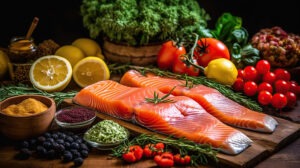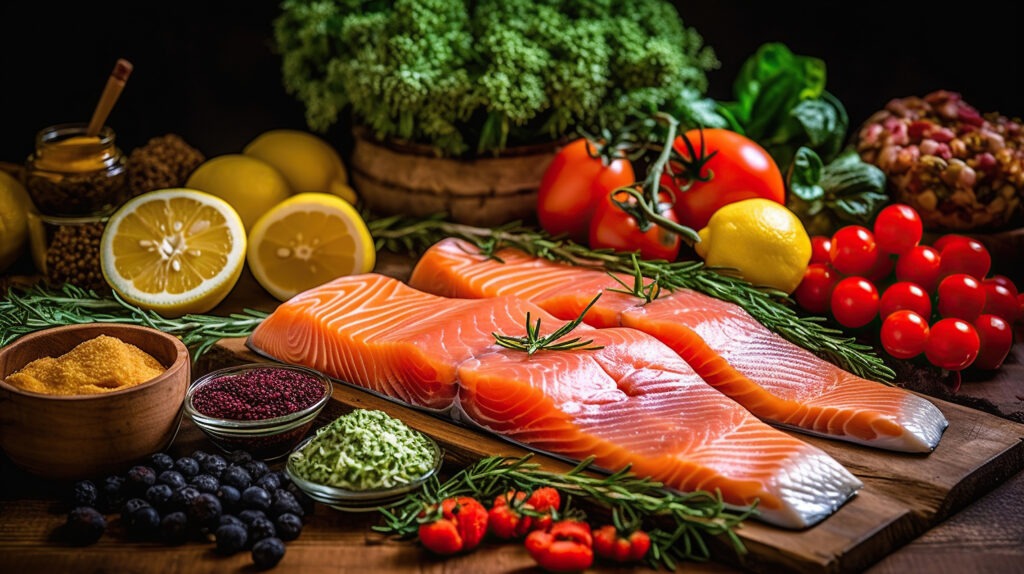Inflammation is a natural response by the body to injury or infection, but when it becomes chronic, it can lead to various health issues. One effective way to combat chronic inflammation is through adopting an anti-inflammatory diet.
I have spent the last year and a half trying to figure out natural holistic ways to help with my own experience with inflammation.
I have read countless books and researched the web to come of up with a system of things that I believe is working for me.
My journey with this started when I was dealing with my shoulder being inflamed. I went to countless doctors and had so many tests done. But nothing seemed to help.
Over the course of the past year I have taken things into my own hands because I did not constantly want to take Motrin or Tylenol to fight whatever was going on inside of my body.
A lot of these tips are things that I incorporate into my life on the daily.
Part of the reason I started this blog was because I want to share this information in hopes that it can help at least one other person who may be dealing with something similar.
In this blog post, we are going to explore the ins and outs of inflammation, identify inflammatory and anti-inflammatory foods, discuss the the risks of chronic inflammation, and provide practical tips for incorporating an anti-inflammatory diet into your lifestyle.
I hope this information helps you like it did for me. Let’s dive in.
What is inflammation?
Inflammation is the body’s natural defense mechanism against harmful stimuli. It involves white blood cells, immune cells, and molecular mediators working together to repair damaged tissues and protect against infections.
In most cases when we see inflammation in the body, it’s a good sign. However Chronic inflammation can do major harm to our bodies.
Fortunately, there are many ways to fight inflammation. Consuming certain foods and limiting others can help with the prevention.
What are Inflammatory Foods?
Inflammatory foods can significantly contribute to chronic inflammation within the body. Understanding these culprits is crucial for adopting an anti-inflammatory lifestyle.
Here’s an extended list, along with explanations of why each can promote inflammation:
- Refined Sugar: High intake triggers the release of inflammatory messengers called cytokines. Found in sugary beverages, pastries, and candies.
- Trans Fats: Promotes inflammation by damaging cell membranes. Present in partially hydrogenated oils often found in fried and processed foods, margarine, and certain baked goods.
- Processed Meats: Contain advanced glycation end products (AGEs), which can promote inflammation. Examples include sausages, hot dogs, and certain deli meats.
- Artificial Additives: Certain additives, like artificial sweeteners and preservatives, may trigger inflammatory responses. Found in many processed and packaged foods.
- Vegetable Oils: Some vegetable oils, particularly those high in omega-6 fatty acids like soybean and corn oil, can promote inflammation when consumed in excess.
- White Bread and Pastries: Refined carbohydrates in these foods can cause a spike in blood sugar levels, leading to increased inflammation.
- Excessive Alcohol: Beyond moderation, alcohol can contribute to inflammation and damage to the liver.
- Highly Processed Snacks: Chips, crackers, and other processed snacks often contain unhealthy fats, sugars, and additives, all contributing to inflammation.
- Conventional Dairy Products: Some individuals may experience inflammation from certain proteins in conventional dairy. Opting for alternatives like almond or coconut milk may be beneficial.
- Artificial Sweeteners: While marketed as sugar substitutes, some artificial sweeteners may disrupt gut bacteria, potentially leading to inflammation.
- Certain Cooking Oils: Vegetable oils high in omega-6 fatty acids, like sunflower oil, can tip the balance towards inflammation when used excessively in cooking.
Understanding the impact of these inflammatory foods is the first step towards making informed dietary choices that promote overall health and well-being.
Processed Foods: Read the Label
Processed foods, often convenient but full of hidden inflammatory triggers, deserve our attention.
Here’s why and how you should navigate the labels:
Understanding Hidden Sugars:
Processed foods frequently harbor copious amounts of added sugars. While sweet treats are an obvious source, unsuspecting culprits like salad dressings, condiments, and even seemingly healthy snacks can contain excessive sugars.
These hidden sugars can contribute to inflammation by spiking blood sugar levels and promoting the release of pro-inflammatory cytokines.

Transparency on Trans Fats:
Reading labels allows you to identify the presence of trans fats, often disguised as partially hydrogenated oils. These harmful fats, prevalent in many processed foods, contribute to inflammation by compromising cell membrane integrity. Be cautious of packaged snacks, fried foods, and certain margarines.
Navigating Sodium Levels:
Excessive sodium intake is another hallmark of processed foods. While salt is essential, many processed items, from canned soups to pre-packaged meals, can push your daily sodium intake beyond recommended levels.
High sodium levels can contribute to inflammation and potentially exacerbate conditions like hypertension.
Steering Clear of Additives:
Artificial additives, including preservatives, colorings, and flavorings, are commonplace in processed foods. While artificial additives are designed to enhance shelf life and taste, some individuals may react adversely to these additives, triggering inflammatory responses.
Opting for whole, unprocessed foods whenever possible minimizes exposure to these potential irritants.
Opting for Whole, Real Foods:
A crucial aspect of an anti-inflammatory lifestyle is choosing whole foods in their natural state.
Fresh fruits, vegetables, lean proteins, and whole grains are rich in nutrients without the additives, sugars, and unhealthy fats often found in processed alternatives.
Deciphering Food Labels:
Become aware of reading the food labels by paying attention to ingredient lists, nutritional information, and serving sizes. Look for products with minimal added sugars, trans fats, and artificial additives.
Prioritize foods with recognizable, simple ingredients, and consider choosing products with third-party certifications indicating adherence to quality standards.
The lower the amount of ingredients, the better. Stay clear of products that have an excessive ingredient list.
Anti-inflammatory Foods
Incorporate these 10 powerhouse foods into your diet:
- Fatty Fish (Salmon, Mackerel): Rich in omega-3 fatty acids, known for their anti-inflammatory properties.
- Berries: Packed with antioxidants that combat inflammation.
- Broccoli: Contains sulforaphane, a potent anti-inflammatory compound.
- Turmeric: Curcumin, the active ingredient, is a powerful anti-inflammatory agent.
- Green Tea: Polyphenols in green tea help reduce inflammation.
- Avocado: Contains monounsaturated fats with anti-inflammatory effects.
- Extra Virgin Olive Oil: A rich source of antioxidants and monounsaturated fats.
- Dark Chocolate (in moderation): High cocoa content has anti-inflammatory properties.
- Tomatoes: Rich in lycopene, which reduces inflammation.
- Nuts (especially walnuts): Packed with omega-3 fatty acids and antioxidants.

How to Reduce Inflammation: One Meal at a Time
Adopting an anti-inflammatory approach to your diet is a powerful strategy for promoting overall health and well-being. It also can be a bit complicated if you have no experience in understanding what foods may be causing you to have inflammation.
I know when I first started to personally focus on this, I had to read a lot. Google was my best friend. But I also found most of my information from books.
Here are detailed tips on how to reduce inflammation, one meal at a time:
1. Prioritize Omega-3 Fatty Acids:
Incorporate fatty fish such as salmon, mackerel, and sardines into your diet. These fish are rich in omega-3 fatty acids, which have potent anti-inflammatory properties. Consider supplementing with fish oil if it’s challenging to meet your omega-3 requirements through dietary sources alone.
2. Embrace the Mediterranean Diet:
The Mediterranean diet, characterized by an abundance of fruits, vegetables, whole grains, and olive oil, is renowned for its anti-inflammatory benefits. Opt for a variety of colorful, nutrient-dense foods that form the foundation of this heart-healthy diet.
3. Limit Refined Carbohydrates:
Reduce your intake of refined carbohydrates like white bread, pastries, and sugary snacks. These foods can cause spikes in blood sugar levels, triggering inflammatory responses. Choose whole grains like quinoa, brown rice, and oats for sustained energy and reduced inflammation.
4. Load Up on Antioxidant-Rich Foods:
Antioxidants combat oxidative stress and inflammation. Include a rainbow of fruits and vegetables in your meals to benefit from a wide range of antioxidants. Berries, spinach, kale, and bell peppers are excellent choices.
5. Spice it Up with Turmeric:
Turmeric contains curcumin, a powerful anti-inflammatory compound. Incorporate turmeric into your cooking or consider taking turmeric supplements to enjoy its potential health benefits.
6. Stay Hydrated with Green Tea:
Swap sugary beverages for green tea. Rich in polyphenols, green tea has anti-inflammatory and antioxidant properties. It’s a refreshing and healthful choice to support your anti-inflammatory efforts.
7. Opt for Healthy Fats:
Choose sources of healthy fats, such as avocados, nuts, seeds, and extra virgin olive oil. These fats contain monounsaturated and polyunsaturated fatty acids, which help reduce inflammation and support heart health.
8. Mindful Cooking Oils:
Opt for cooking oils that are high in monounsaturated fats, like olive oil. Additionally, consider coconut oil, which contains lauric acid with potential anti-inflammatory effects. Use these oils in moderation to enhance the flavor and health benefits of your meals.
9. Include Anti-Inflammatory Herbs and Spices:
Incorporate herbs and spices like ginger, garlic, cinnamon, turmeric, and rosemary into your meals. These flavorful additions not only enhance the taste but also contribute to the anti-inflammatory properties of your dishes.
10. Moderate Alcohol Consumption:
While some studies suggest that moderate alcohol consumption, particularly red wine, may have anti-inflammatory effects, excessive alcohol intake can contribute to inflammation. Enjoy alcohol in moderation and be mindful of its potential impact on your overall health.
By making conscious choices in your daily meals, you can create a nutritional environment that actively works against inflammation. Remember, the key is to adopt these changes gradually and make them sustainable for long-term health benefits.
What Conditions Can an Anti-Inflammatory Diet Help?
An anti-inflammatory diet may contribute to managing or preventing conditions like:
- Arthritis
- Heart disease
- Diabetes
- Asthma
- Inflammatory bowel diseases
- Obesity
- Alzheimer’s disease
- Certain cancers
- Autoimmune disorders
- Chronic pain syndromes
Anti-Inflammatory Herbs and Spices
Include these herbs and spices in your culinary repertoire:
- Ginger: Contains gingerol, with potent anti-inflammatory effects.
- Garlic: Allicin, a compound with anti-inflammatory properties.
- Cinnamon: Known for its anti-inflammatory and antioxidant properties.
- Rosemary: Contains rosmarinic acid, an anti-inflammatory agent.
Tips for Anti-Inflammatory Diet
Here are 10 tips to integrate into your daily life:
- Prioritize Omega-3s: Include fatty fish, flaxseeds, and chia seeds.
- Colorful Plate: Eat a variety of colorful fruits and vegetables.
- Herbs and Spices: Use them liberally for flavor and health benefits.
- Whole Grains: Choose quinoa, brown rice, and oats.
- Lean Proteins: Opt for sources like poultry, tofu, and legumes.
- Limit Alcohol: Excessive alcohol can contribute to inflammation.
- Stay Active: Regular exercise helps combat inflammation.
- Adequate Sleep: Poor sleep can promote inflammation.
- Manage Stress: Practice stress-reducing techniques like meditation.
- Hydrate: Water is essential for overall health.
Risks of Chronic Inflammation
Chronic inflammation is linked to:
- Cardiovascular diseases
- Cancer
- Diabetes
- Neurodegenerative diseases
- Autoimmune disorders
- Respiratory issues
- Obesity

What can you eat on an anti-inflammatory diet?
Focus on:
- Fruits and Vegetables
- Fatty Fish
- Whole Grains
- Nuts and Seeds
- Herbs and Spices
- Healthy Fats (Olive Oil, Avocado)
- Lean Proteins
Adopting an anti-inflammatory diet is a proactive step toward better health.
Aren’t we all trying to feel better and focus more on our health?
As we try to understand the impact of different foods on inflammation and incorporating anti-inflammatory choices, you can contribute to long-term well-being.
Remember, it’s not just a diet. It really is a lifestyle that embraces the healing power of whole, nutrient-rich foods. Food is medicine.
Stay tuned for my Anti-Inflammatory Meal Plan coming soon.
You may also like:
The ABCs of the 3 Macronutrients




